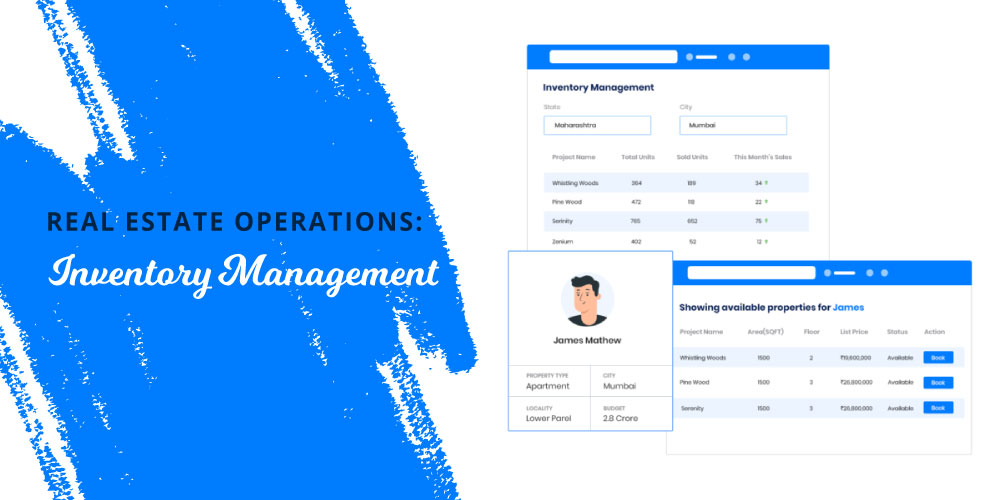Before 2020, the real estate industry was reluctant towards automation due to the lack of understanding of possible ROIs. But the Covid-19 pandemic was a grim reminder of why those investments would be worth it. The real estate developers had no choice but to reimagine their operations. With people locked in their homes and one of the deadliest contagions on the rise, realtors had a question on their minds: How is the business supposed to go on?
Businesses dependent on only offline sources for lead generation saw their lead volumes drop drastically. The lack of digital presence shrunk their sales funnel. Apart from this, property sales that were dependent on interpersonal interactions, stalled due to the lockdown.
Remote working was a completely new concept in the real estate industry, and for this reason, there was a lot of uncertainty. Since the real estate business involves working on the site, some developers were concerned about the WFH productivity of their sales agents. The real estate industry was facing serious challenges that needed an immediate resolution.
So, what was the solution?
Businesses dealt with these problems in their own ways. While some decided to offer discounts on their ongoing property deals, others facilitated customer finances and eased the unrest among the buyers. Some focused more on digital marketing while others used productivity tools such as e-conferencing, cloud calling, digital walk-through, and more to provide an improved home buyer journey.
But the aim of all these activities was to create new digital infrastructure which could enable property sales. One element which was intrinsic to this digital infrastructure was automation.

So, let us discuss how automation in real estate operations is helping the industry sell properties online.
Automation in real estate operations
According to a survey by McKinsey involving 800 executives, 85% of companies globally have accelerated their digital transformation. 67% have directed their focus on automation and artificial intelligence.
The real estate sector is not untouched by automation. Developers have started to invest heavily in technology across different verticals and are seeing positive results. The following are the key areas where automation has proved beneficial.
1. Construction

In an interaction with BusinessLine last year, Mr. Andrew Anagnost, President and CEO of Autodesk, commented on automation in the Indian construction space:
“Several hurdles that the Indian construction sector face includes frequent miscommunication and workflow disruptions, leading to project delays and cost overruns. Automation presents an opportunity to do things better – technologies such as AI, BIM, and cloud-based collaboration can help in addressing these challenges for increased productivity, lower risks, and better quality of output.”
With advances in Building Information Modeling (BIM), AI, drone tech, 3D printing, and more, developers are able to draw more insights into the building process. These insights help them improve their construction timelines and consequently increase the pace of delivery.
3. Sales

The real estate sales strategy was highly impacted by automation. Many realtors have automated some parts of their sales process and achieved better results.
For instance, real estate developers get leads from various channels, a few of them being:
- Social media
- Organic
- Channel partners
- Offline sources
Usually, a team member collects leads from all these sources and passes them to the sales representatives or agents. But the problem is – they have to check all these lead-gen platforms individually, from time to time. Often, the leads are missed and result in a loss of business opportunities. That is why realtors needed a platform that can collect inquiries from all these sources automatically.
Also, realtors wanted to identify the best source of lead generation and plan their investments accordingly. For this, tracking the lead journey becomes crucial.
The solution:
With an automated lead capture solution, property managers can ensure zero lead leakage and generate higher revenues.
Other benefits of lead capture automation include:
- Tracking lead source
- Understanding the performance of your lead generation sources.
We can find another instance of automation in sales.
Once the lead enters the system, sales agents must attend to them instantly. In other words, the turnaround time or TAT should be as low as possible. Before Covid, lead allocation used to be a manual process. Any data related to allocation was managed through Excel/Google sheets. Inaccuracy in data entry was a common challenge that led to missing on leads. Additionally, sometimes presales/call-center agents were assigned incorrect leads that further added hassle to their work.
To solve this problem, developers turned to automated distribution. For example, with LeadSquared Real Estate CRM, developers could segment leads and allocate them to various agents based on attributes such as:
- Region
- Property type
- Income
- Age
- Type of amenities
- Agent availability
Lead segmentation also helps in accurately mapping leads and agents. This way, agents who have expertise on a particular property type converse with leads looking for information about those properties.
Sales: Call Center Team
Interactive Voice Response tools or IVRs are also a go-to option for many developers to manage their call centres. IVRs can help you analyse the steps necessary to improve your call center agents’ productivity.
For example, IVRs can help you:
- Maintain data through cloud contact centers
- Create lead record from missed calls/voice mails and follow-up with them later.
- Create virtual business numbers for your online and offline marketing campaigns
- Connect and track your presales and post sales calling activities
Through the features mentioned above, developers can understand agent productivity and take measures to improve it, whenever necessary.
4. Marketing

The rise of digital channels as the main source of lead generation is changing the real estate landscape. Hence, in such a fast-paced and digitized market, communication with customers can remain as a challenge.
This is where marketing automation tools can help you out. According to HubSpot, 68% of marketers are now using marketing automation. A marketing automation tool can help you:
- Create attractive landing pages and capture leads automatically
- Spot sales signals from a prospective buyer
- Encourage action by sending personalized content to buyers
- Trigger re-engagement campaigns for cold leads
- Enable omnichannel communication across several platforms
Some of the sales signals that can be captured by marketing automation tools are:
- Email opens
- Website visits
- Inbound calls
- Outbound calls
These activities can help marketers gauge the lead engagement. Once the intent is identified, you can run drip campaigns to push the lead further down the sales funnel.
Marketing automation tools can also be used for retargeting leads on Facebook and Google. Moreover, such tools allow you to set triggers and notify you when there is an opportunity. It improves the conversion rates and helps you achieve a higher ROI.
5. Reporting

Reporting is one of the crucial aspects of real estate operations. Data generated from operational processes is collated to identify agent performance, channel performance, rate of absorption, and more. Besides, deriving insights from business data also helps in strategic decision making.
Real Estate professionals have been using Excel and Google sheets for reporting purposes. But it needs setting filters and rules, cleaning data, and more that increases the chances of errors – if not done properly. And inaccuracy in reports can create a gap between the actual operations and the perceived results.
Due to such limitations, developers are keen on automating reporting. For instance, many CRMs can integrate with your IVR, mobility solutions, inventory modules, and more and centralize data management. With this, managers and decision makers can fetch reports on:
- The performance of lead generation sources
- Agent productivity
- Revenue generated
- Custom metrics
- Real-time data
Indeed, one of the advantages of these automated reports is that you can schedule them to come in your inbox. It gives you the birds-eye view of all your real estate operations.
6. Finance

Robotic process automation or RPA is taking the industry by storm. For instance, RPA can automate 70-80% of repetitive tasks performed in the real estate industry. One such use case solved by RPA is that of the finance. RPA can help real estate firms achieve the following:
- Automate bank and account reconciliation
- Automated invoice generation
- Perform e-KYC
- Improve compliance and reduce fraud
With machine learning tools and optical character recognition (OCR), you can automate most finance-related real estate operations. AI/ML also helps the real estate market by forecasting loan defaulters and improving investor analytics.
7. Inventory management

New property launches saw a 112% increase in Q4 vs. Q3 of 2020. This year, developers are introducing even more inventory into the market to make the most out of the improved buyer confidence. Although, the sales have incremented, there is still a gap between the supply and the demand side. In such a case, manual inventory management (IM) practices can hurt more than they do good.
Many IM modules can give you real-time insights into the inventory. While these modules improve asset management, they also reduce redundant costs. Using AI/ML-based technologies, developers can improve the flow of inventory and furthermore, understand KPIs that can improve property absorption rates. Plus, data from these platforms aid future projects and their demand planning.
8. Tenant Onboarding and Management

Tenant onboarding and management is another real estate operation that can benefit from automation. Realtors and property managers can improve tenant onboarding efficiency by:
- Automating new tenant application process
- Using technology to perform background checks
- Verifying income and employment
- Managing approval, or disapproval of applicants
Through tenant management platforms, you can set up automated rent collection process. It can also include sending reminders to existing tenants and a payment link. Additionally, you can also set up escalations in case of incomplete payments. Therefore, managing many tenants in properties across various geographies is now easier than ever.
Conclusion
According to a PwC report, AI/automation may add $15.7 trillion to the global economy between 2017 to 2030. In 2019, Gartner reported that more than 37% of businesses had implemented AI and automation tools in some form.
Today, automation is everywhere, in some form or the other. Many real estate firms are striving to create a digital infrastructure that will offset the impact of Covid-19 pandemic and cut any future losses. Hence, as a real estate developer in 2021, your focus must be on bringing flexibility and sustainability into your processes. By automating real estate operations, you can build a scalable and highly efficient business model.
LeadSquared Real Estate CRM can help you achieve sales efficiency and maximize the ROI. Sign up to find out how!








